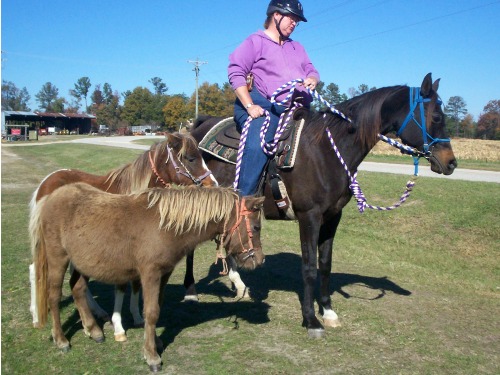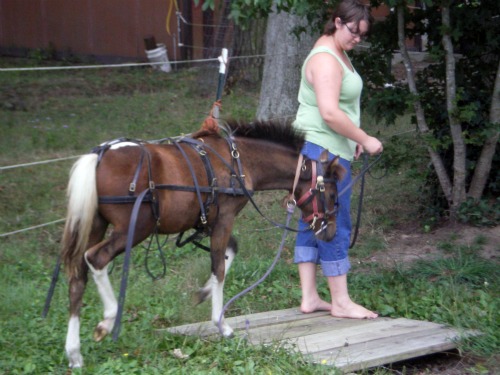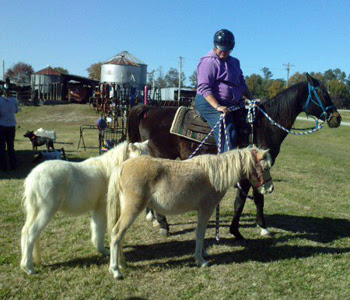Partially they are allowed to be baby horses. Partially - they have all the ground work laid for adulthood training - just scaled down.
I'm in a position now where I don't have just one yearling or one youngster under the age of 5. So they run in groups with their "mates" of the same sex and similar ages (well the jr mares are up to 4 years of age now with a 22 yr old arab "nanny" mare in the same pasture). The boys are in another pasture - some gelded, some still stallions. Both sexes - in their own pastures - play and roughhouse at different times of the day. They run, they spook, they buck. They bite, strike and kick one another and when they are tired - they either quit playing or back out of the rough play as the others continue. This goes on - off and on thruout each day and nite!! When tired, they curl up sometimes by themselves or all in a group. When really sleeping - they lay flat out - at this time of year they do this a lot around mid-morning and again about mid-afternoon. At night - I don't think I've ever seen them lay flat out - they stay curled up where they can get up in a hurry if something "bothers" them. They all live outside.
So, if you are the only one around them (or your children are) - handling times need to be enforced as "not playtime". You and children aren't their playmates. No biting or kicking, rearing or striking allowed - and some do try or want to. Some more than others
regardless of sex. Corrections have to be right when they did something wrong and be one swift but strong correction - not too relaxed/wimpy or too aggressive. If the yearling shows they are going to kick -can be as simple as stepping in close to them so they can't even get the leg off the ground. Pulling the head around so they are facing you. Pawing or rearing - a harsh swat to the shoulder or belly - with a praising rub to the neck, head/face when hooves both on the ground. Biting and being mouthy can be more difficult. Most say don't hit them on the head or muzzle - you make them headshy. Hmm - I try not to do so but I'm human and if I get nipped whether expecting it or not - sometimes I react. I find that because I'm aware that hitting them can make them headshy or teach them its a game (I usually miss - and when they learn to avoid, it's an instant game with some - had a filly that was TERRIBLE - sneaky snake her head and and literally grab you - tearing clothes and skin alike and then would dance away "waving" her "prize"). Better than striking them around the head is a healthy swat to the chest. Or better - if you have a hold of them - take their muzzles in your hands and irritate it. Rub, rub, rub - upper lip, chin, nostrils, inside the lips, over the gums. Everytime they reach for you. They will soon learn 2 things - that having thier mouths on you is a "nono" and that you can handle their mouths, lips and chins. Two good things. If they are truly "mouthy" all the time - wanting to grab anything and everything - I've bitted some of mine with tiny bits and a simple headstall of string or leather (as early as 2 months of age on one shetland/arab colt we had!). That does several things - gives them something to mouth/chew and teaches them to carry the bit. Works great when you are grooming them. Teach them that your space is yours and that they have to be invited "in" to get a scritch, a rub or a treat (if you give treats). They aren't allowed to push you, run you over, jump on you or touch you.
That said - this is a pic of our daughter with one of our colts -
Our daughters spent a lot of time in the pastures with our ponies - and I often found this one (Sierra - herself born in aug 93), napping with the babies. The colt above was born in July 98 so he is a "yearling" tho only about 9 months of age. Sometimes the mares stood over them in "guard mode" as well. Never had an issue that I know of where the girls were bit, kicked or stepped on - but understand Sierra started riding when she was just 22 months old in June of 95 and from that age participated in all phases of pony care and training.
Teaching them to stand quietly for grooming, leading from both sides, circle driving extending into actual ground driving. Wearing a bit/bridle, wearing blankets - saddle or stable type. Sack her out - using blankets, towels, flags, actual walmart or feed bags. Get her used to objects touching her, waving around her or being tossed around and over her. Going for walks - extending them to up to a couple of hours isn't a bad thing. If you ride, "pony" them along. In the past I've done enough ponying over the years that with a good "pony horse", I could pony (lead) several at a time on trail rides or down the road to a barn that had horse activities going on. Teach her to accept clipping, bathing, standing on a board - leading to loading in a trailer - by asking, telling her or pointing to the trailer and she walks on in on her own. Teach her to lead and go over or thru obstacles on her own - water, tarp, see saw, cavaletti, uphill, ditches, downhill.
Tricks (I've not done this one
) - I've heard some yearlings are great at learning tricks!
Only things that limit you are short attention spans and young, developing bodies that can't take a lot of strenuous or circle work at speed. Lots of great info out there on working with babies. John Lyons has a book - printed from monthyly articles in a magazine called "Raising Baby". If you are into NH stuff - Clinton Anderson & Pat Parrelli both have excellant DVDs out on what to do with and how to do it with babies - where/how to start, where to go with progression, what to do if something goes wrong. There is more - that's what I'm familiar with.

Hooves and teeth are individual. I find that most of our yearlings are on a regular 8 week schedule for hooves - tho this year have one 2 yr old gelding and 1 yrlg stud colt that were bumped to every 4 weeks since they had hoof issues. Teeth we usually have no issues with and sometimes they get checked sometimes they don't. They get coggins and rabies shots (by the vet) annually after 6 months of age (or when they are weaned) here - so that's a great time to have their teeth checked. I give their other shots based on the schedule my vet set up for us - as yearlings they get shots 2x a year (WN, EWT - I don't typically give flu or rhino unless they are being shown or hauled out) - if we have a hurricane that is coming our way, we often give a 3rd set of shots as mosquitos pick up a lot then... If I bred and raised them, they switch from the monthly worming to every 60 days with the rest. If they look "rough" or unthrifty - they get a powerpac of Panacur and if they don't pick up we investigate with the vet. Currently have one coming 3, one coming 2, and one coming yrling on a high fat feed additive (may switch to Calf Manna as pointed out here) along with having increased their feed quite a bit as they have that "hay belly" look going on.

The colt above is actually still a weanling in this pic. Our youngest daughter (Sierra - in HS here), took a shine to him and often "played" with him. He is a 1/2 shetland, 1/4 arab, 1/4 hackney pony that we expect to be about 12 or 12.2 hh at maturity. YES - I know that she is BAREFOOT. ( I hated that - she spent the last two years she lived with us always barefoot outside UNLESS actually riding with a saddle. She's in her last year of a 2 yr college program now - and moved into her own apartment last summer at the age of 18. She comes home and spend lots of time outside in the pastures either with us or a freind to get her "horsey fix".). He is wearing a mini sized harness and bit (the lines aren't hooked to the bit). This "training" was not done everyday or for long. In fact, I think she did this for about 3 days a week for maybe 2 weeks and then during exams "forgot" about all things horsey! This colt has had this type of trainig - building on each step and is currently a healthy, well adjusted coming 2 yr old gelding that might be ground driven some this summer all the way to being hitched. He's had maybe a total of 60 days of "concentrated" handling. He's only been in the horse trailer a handful of times - he's been hauled out to "driving" lessons 2x - where Sierra actually "drove" him for two of her lessons...
If you haven't ventured over there yet - in the driving Minis section - there is a series of videos one of the forum members (studioww) did that shows what she's doing/done with two differnt yearlings (well babies still actually). In the snow and ice with great explanations of what she's doing, why and how it is different with each of the two colts' personalities. Best of all - have fun and enjoy your yearling!
 ..thank you!
..thank you!







